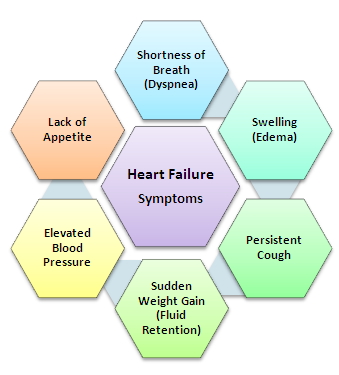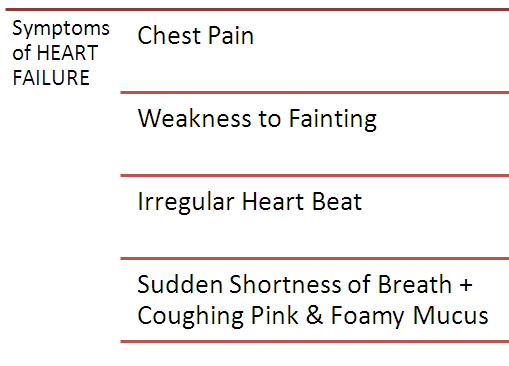To all my Diabetic Readers:
Check your Heart to prevent the worst!

Hi dear readers,
Today, I was wondering what topic would be of interest for you? At the end, I choose the “HEART”. We give heart in everything we do, but what kind of health we are offering to our heart?
Here, we will discuss about heart failure, what it is, signs and symptoms, how to treat it adequately. The most important thing is to discuss how to prevent it especially in diabetic patients.
What is Heart Failure?
"Heart failure is a chronic, progressive condition in which the heart muscle is unable to pump enough blood to meet the body's needs for blood and oxygen."
This definition is according to the American Heart Association (AHA). And, the heart does not work properly, managing its workload as normal. However, it is going underestimated, i.e it is not taking the right attention by the healthcare providers. So, it is becoming a serious concern.
It is a must to get the patients well trained about its possible symptoms and symptoms and appropriate care. Many international meetings do conclude that the treatment of heart failure in diabetic patients is getting an aggressive trajectory.
"There's so much new data coming out all the time. We want to bring attention to the fact that diabetes and heart failure have substantial overlap, and it's important to stay up to date on new information,"
said Dunlay, a heart failure cardiologist at the Mayo Clinic in Rochester, Minnesota.
On the other hand, during heart failure, insufficient oxygenated blood is pumped throughout the body. Studies have confirmed that this is a risk factor for diabetes or aggravating diabetes when already set.
Why do Heart failure happens in Diabetics?
There are some points I wanted to pass to you today, so it would be much easier for you to discuss them with your doctor and take the most appropriate actions:
- As heart failure is mostly associated with the use of certain diabetic drugs (dipeptidyl peptidase-4 (DPP-4) inhibitors). So far, the exact mechanism of how these medications cause heart failure is not found yet. However, precautions to all patients who are currently taking those drugs, please discuss with your doctor for your chances to get heart failure.
If your chances are high, then, tell your doctor for any other less risky option you might have. Otherwise, go on with your current drugs, but being very attentive of the possible signs of heart failure (as given in the following sections).
- Next, thiazolidinediones diabetic drug group is also associated with heart failure more than myocardial infarct or stroke. Fluid retention is a well known mechanism of how these medications cause heart failure. Furthermore, the older the age, the higher the chance for having heart failure. Thiazolidinediones are known to promote insulin signaling. This and the older age increase the chance for developing heart failure.
If there heart failure is confirmed, patients should stop taking any of thiazolidinediones drugs including rosiglitazone, and start immediate therapy with potassium-sparing agents such as spironolactone or amiloride.
- Furthermore, no matter the drug you are taking to fight diabetes, you must understand that heart failure can be developed quickly. This is because of the difficulty for dealing with abnormal blood sugar levels and fatty acids by the heart cells. Furthermore, diabetes can damage the blood vessels and nerves that manage to control the cardiovascular system (the heart and blood vessels). As you may see, it becomes more difficult to manage all this "stress" situation, leading to getting heart failure in diabetics earlier in life than for other people. So, it is very important to get to know the signs and symptoms and how to take appropriate care.
What are the signs of heart failure you should notice?

Recognizing the symptoms of heart failure if you have not developed until now would help getting the treatment in time. In case you have already developed heart failure, and the symptoms are getting worse, this means that your situation is aggravating.
The signs that you should be aware of are as following:
- Edema (swelling) of entire body or extremities (legs, ankles, feet)
- Fatigue or feeling weak
- Dyspnea (shortness of breathe)
- Rapid or irregular heart beats that are often felt as Heart palpitations
- Chest pain
- Persistent coughing
Once you notice any of these symptoms, should seek immediate medical help.
Prevention and Treatment of HF in Diabetics
The very first thing in preventing development of heart failure in diabetics is to take good control of possible risk factors such as hyperglycemia, blood pressure, cholesterol, albuminuria, smoking cessation, etc.
If coronary artery disease is prevented and if there is good control of blood pressure, the risk for HF is also reduced.
Furthermore, if the diabetic patient is taking hypoglycemiants that has shown to increase the risk for HF, that medication should be immediately stopped.
Lifestyle changes known as Lifestyle Interventions are also very important in preventing and/or managing HR in diabetics.
With regards to treatment of heart failure, that is similar to the treatment for non-diabetic patients. The treatment scheme for heart failure include diuretics, angiotensin converting enzyme inhibitor (ACE-i) or antagonists of angiotensin II receptor inhibitors (ARA-II), beta-blockers, etc.
It depends on your current health situation and problems, and your doctor will take the best decision for best treatment in your case.
Written by Dr.Albana Greca Sejdini, Md, MMedSc
Medically reviewed by Dr.Ruden Cakoni, MD, Endocrinologist
References:
- Home
- Complications
- Is your Diabetic Heart Killing you softly?
Last reviewed 07/28/2021
Diabetes complications Questions or Problems? Get Help Here
This is the place where you can ask a question about any aspect of diabetes complications.
It's free and it's easy to do. Just fill in the form below, then click on "Submit Your Question".